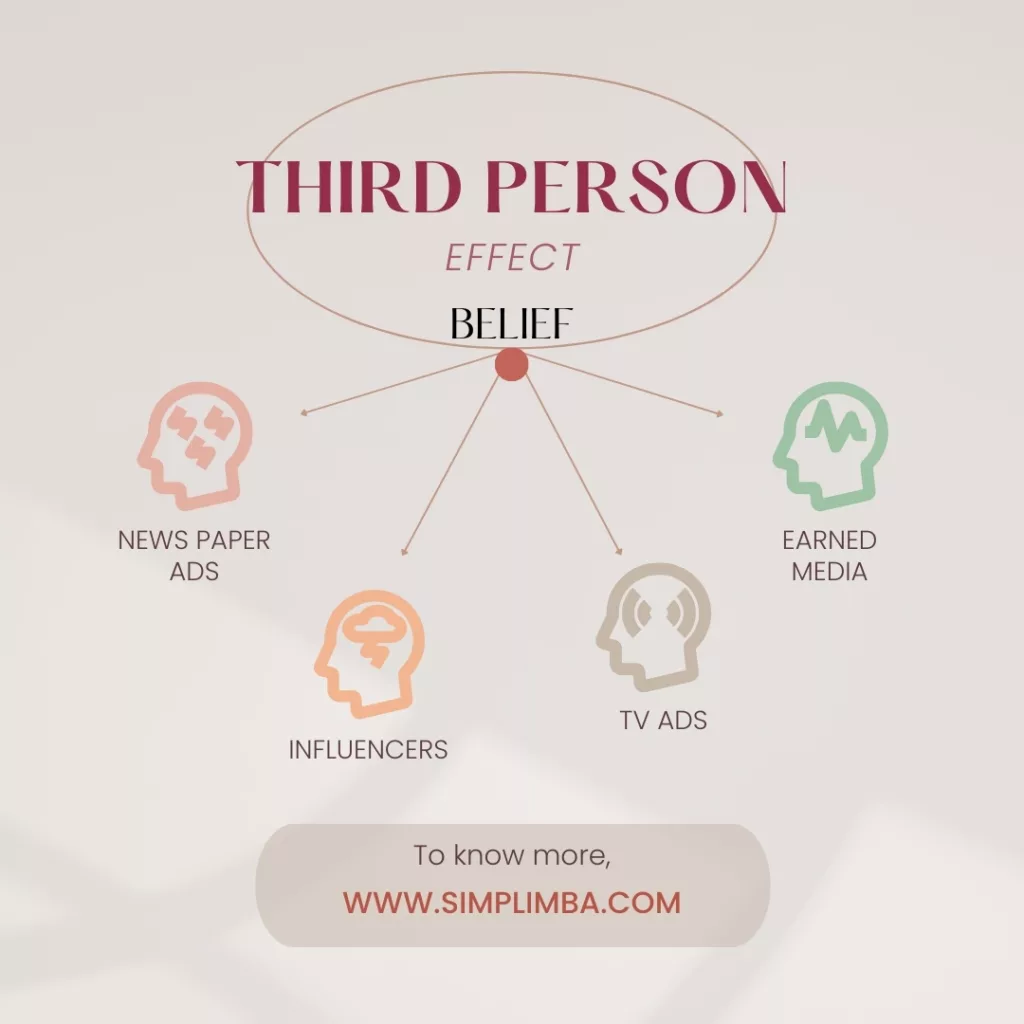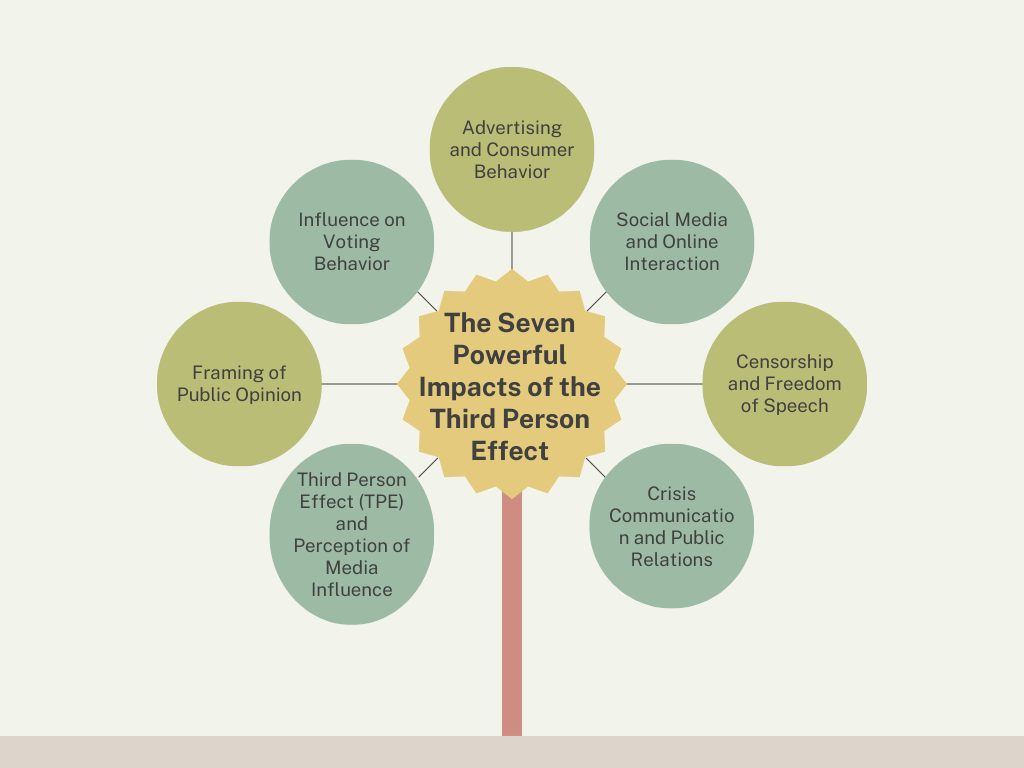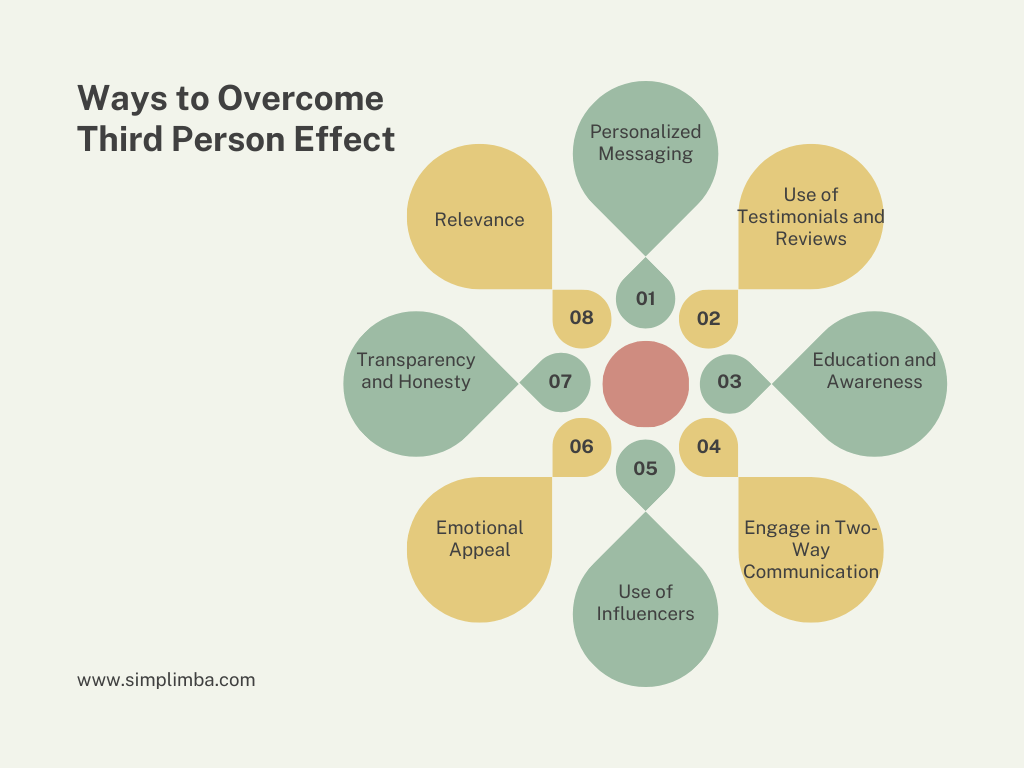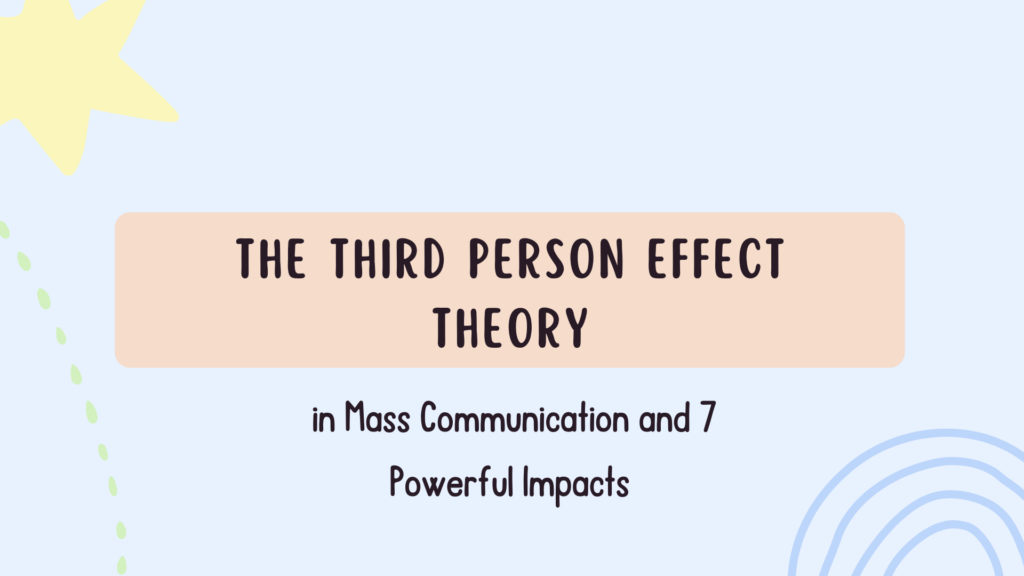Introduction
Brief overview of the Third Person Effect
The Third Person Effect is a psychological theory developed by W. Phillips Davison in 1983. It hypothesizes that individuals tend to perceive that mass-communicated media messages have a greater effect on others than on themselves. This is often due to a biased perception of personal invulnerability or superiority, leading individuals to believe they are less susceptible to the influence of persuasive messages than others.
The formula for this effect can be expressed as:
Perceived Effect on Self < Perceived Effect on Others
This formula indicates that the perceived effect of a message on oneself is less than the perceived effect of the same message on others.
Read about Mass Communication theories that changed the world forever in our comprehensive blog here
Importance of understanding this concept in mass communication
Understanding the Third Person Effect is crucial for marketers and advertisers as it can significantly impact the effectiveness of a campaign.
Crafting Effective Messages: By understanding that consumers often believe they are less influenced by advertising than others, marketers can tailor their messages to overcome this perception. This could involve using more subtle persuasion techniques or creating content that consumers find personally relevant and engaging.
Predicting Audience Behavior: The Third Person Effect can also influence how people react to media messages. For instance, individuals who perceive a harmful effect of a media message on others may support censorship of that message. Understanding this can help marketers predict and manage potential backlash to controversial content.
Enhancing Persuasion: Lastly, understanding this effect can enhance persuasion. If a marketer can make a consumer feel that a message is personally relevant, they may be able to overcome the Third Person Effect and increase the likelihood of the consumer taking the desired action.
Psychological principles that drive the Third Person Effect
The third person effect is a psychological hypothesis that suggests individuals tend to perceive that mass communication messages have a greater effect on others than on themselves. This cognitive bias leads people to believe they are less susceptible to persuasion tactics than others, creating a false sense of security or superiority.
The psychological principles that drive this phenomenon include:
Optimism Bias: This is the belief that one is less likely to experience negative events. In the context of the third person effect, individuals believe they are less likely to be influenced by persuasive messages than others.
Self-Enhancement: This principle refers to the tendency of individuals to perceive themselves in a more positive light compared to others. This leads to the belief that they are less susceptible to manipulation or persuasion.
Attribution Bias: This is the tendency to attribute one’s actions to internal factors (like intelligence or resilience) while attributing others’ actions to external factors (like influence from media or persuasive messages).
Real-world examples of the Third Person Effect in action

Advertising: A study conducted by Davison (1983) found that people believed others were more influenced by advertising messages than they were. This can lead to consumers underestimating the effect of advertising on their purchasing behaviors.
Public Health Campaigns: People often believe they are less susceptible to the influence of public health campaigns (like anti-smoking or safe driving campaigns) compared to others. This leads to a reduced effectiveness of these campaigns.
Political Propaganda: During election periods, voters often believe that political propaganda influences other voters more than it influences them. This can lead to voters underestimating the impact of such propaganda on their voting decisions.
Social Media: With the rise of social media, the third person effect is more evident. Users often believe they are less likely to be influenced by social media trends or viral content compared to others.
Read about Mass Communication theories that changed the world forever in our comprehensive blog here
The Seven Powerful Impacts of the Third Person Effect

Third Person Effect (TPE) and Perception of Media Influence
The third person effect is a psychological theory stating that individuals tend to perceive that mass media messages have a greater effect on others than on themselves. A real-life example of this is the perception of news about the COVID-19 pandemic. People may believe that misinformation about the virus has a greater impact on others, leading them to take actions such as social distancing and mask-wearing more seriously.
Framing of Public Opinion
The third person effect also plays a significant role in shaping public opinion. For instance, during the 2016 US Presidential Election, many people were influenced by media coverage to believe that their fellow citizens were more likely to vote for a particular candidate, affecting their own voting decisions.
Influence on Voting Behavior
The third person effect can significantly influence voting behavior. In the Brexit referendum, for example, many UK citizens believed that the media’s portrayal of the EU’s negative impact on the UK had a greater influence on other voters, which may have influenced their own decision to vote leave.
Advertising and Consumer Behavior
In the realm of advertising, the third person effect is often observed when consumers perceive that advertising influences others more than themselves. This can lead to an overestimation of the effectiveness of advertising campaigns. A classic example is the perception of the impact of fast-food advertising. Many consumers believe that such ads have a greater influence on others’ eating habits, leading them to underestimate their own consumption of fast food.
Social Media and Online Interaction
On social media platforms, the third person effect can lead individuals to believe that others are more susceptible to fake news or propaganda. This can result in heightened vigilance and skepticism towards information shared online.
Read about Mass Communication theories that changed the world forever in our comprehensive blog here
Censorship and Freedom of Speech
The third person effect can lead to support for censorship, as individuals may believe that harmful media content has a greater impact on others. For example, many parents support the censorship of violent video games, believing that such games have a more significant negative effect on other children than on their own.
Crisis Communication and Public Relations
In crisis communication and public relations, the third person effect can influence the public’s perception of a company’s response to a crisis. For instance, during the 2010 BP oil spill, many people believed that BP’s public relations efforts were more effective at influencing others’ perceptions of the company, which may have affected their own opinion of BP’s crisis management.
Ways to Overcome Third Person Effect

The Third Person Effect is a psychological phenomenon where a person believes that mass communication messages have a greater effect on others than on themselves. This can lead to a skewed perception of how marketing messages are received and can impact the effectiveness of a marketing campaign. Here are some strategies to overcome the Third Person Effect:
Personalized Messaging: Craft personalized messages that speak directly to the individual. This can help to overcome the Third Person Effect as the audience feels the message is specifically tailored for them. This can be accomplished through the use of data analytics and customer segmentation.
Use of Testimonials and Reviews: People tend to believe in the experiences of others. Incorporating testimonials and reviews into your copy can make your message more believable and relatable, thereby reducing the Third Person Effect.
Education and Awareness: Educate your audience about the Third Person Effect. By making them aware of this psychological phenomenon, they may be more likely to critically evaluate the message and its relevance to them.
Engage in Two-Way Communication: Engage your audience in a dialogue rather than a monologue. This can be done through social media engagement, surveys, and feedback mechanisms. Two-way communication allows audiences to feel heard and valued, reducing the Third Person Effect.
Use of Influencers: Influencer marketing can be an effective way to overcome the Third Person Effect. People tend to trust influencers they follow and are more likely to believe the message is relevant to them.
Emotional Appeal: A copy that appeals to the emotions of the audience can help to overcome the Third Person Effect. This is because emotional messages are more likely to be perceived as relevant and impactful.
Transparency and Honesty: Be transparent and honest in your messaging. This builds trust with your audience and makes them more likely to believe your message applies to them.
Relevance: Ensure your message is relevant to your audience. This can be achieved through thorough market research and an understanding of your target audience’s needs, wants, and challenges.
Read about Mass Communication theories that changed the world forever in our comprehensive blog here
Samrat is a Delhi-based MBA from the Indian Institute of Management. He is a Strategy, AI, and Marketing Enthusiast and passionately writes about core and emerging topics in Management studies. Reach out to his LinkedIn for a discussion or follow his Quora Page

